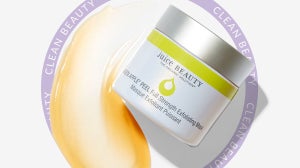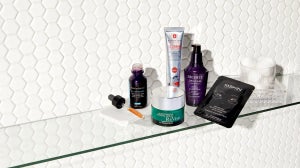
When you shop for your skincare products, you'll notice there are so many key ingredients out there. How do we know which ones we really need? Minerals, Essential Oils, Vitamins... where do we even begin?
Today, we want to focus on one of the key ingredients which is a real beneficial one due to its many fantastic properties. Introducing Vitamin C, and why your skin can really benefit from this potent vitamin.
The beauty industry has long known that Vitamin C — taken internally in food and used externally in creams — is vital for good skin. The nutrient helps form collagen and elastin, essential for plumping up the skin and keeping it taunt and firm. It also acts as an antioxidant to protect us from the harsh effects of the environment, such as UV rays, pollution and a bad diet. The good news is you don't have to force down copious amounts of citrus fruits to give your skin a good dose Vitamin C! Lets break it down by concern and see why exactly we need it...

- ANTI-AGEINGAlthough a lot of products claim differently, many skincare products contain very low concentrations of antioxidants that are not well absorbed by the skin.There are three main antioxidants proven to decrease the effect of the environment on the skin and prevent further damage: Selenium, Vitamin E, and Vitamin C. Vitamin C prevents agents called free radicals from damaging cells in the body and the skin, which speeds up the aging process. Topical Vitamin C with high levels and effective formulations are much more easily absorbed in the skin, effectively preventing ageing skin.
- SKIN BRIGHTENINGWe often associate Vitamin C with health, vitality and brightening, which it is exactly what it is all about. The absorbic acid in Vitamin C prevents the weakening of collagen, ensuring the skin is as fresh and soft as possible. It also helps to heal wounds and reduces capillary permeability, slowing down the process of aging and overall maintaining brighter, lighter skin. To give your skin that added glow and brightened appearance, good quality topical creams are ideal. Our very favorite here at SkinStore is the Kat Burki Vitamin C Intensive Face Creme, which has in its own right built up a loyal, cult following.

Our Vitamin C Intensive face Cream not only brings instant radiance from the 15% Stay C (a stable form of C) but also gets a powerful antioxidant boost from combining it with the 'Immortal' Reishi Mushroom, for extra intensive skin - Kat Burki
Praised from the likes of Marie Claire and In Haute Pursuit, this ultra hydrating cream is light in texture and packed with antioxidants, such as wild reishi mushroom and green tea. The brightening cream features a potent dose of vitamin C (15% rather than the usual 5%) which boosts collagen production, sloughs away dull cells, and repairs any cell damage for a more radiant finish.
- AGE SPOT AND SUN DAMAGE REDUCTIONSimilar to the way that Vitamin C brightens dull skin, it also lightens up age spots and discoloration - which is essentially sun damage. Vitamin C uses its powerful antioxidant properties to reduce the number of sunburned cells, as well as reverse age-related damage to skin. Whilst it’s not a replacement for sunscreen, Vitamin C protects against and may repair UV damage (like discoloration and fine lines). Which brings us onto our next point...
- INCREASES SUNSCREEN EFFECTIVENESSAs mentioned above, Vitamin C doesn't replace your usual sunscreen, but when applied topically it absorbs quickly and kicks in your skins defense mechanism. At the same time, it allows your skin to produce Vitamin D from the sun, unlike commercial sunscreens, which block this essential process. Overall, it offers excellent added protection as well as a recovery solution for environmentally damaged and UV damaged skin.

- HEALS WOUNDSVitamic C is brilliant for clearing dark spots and scars on your body, due to its ability to speed up cell renewal. Vitamin C heals old marks, wounds amd scars by gradually supplying the skin with an abundance of collagen. This doesn’t just aid in reducing the appearance of scars and wounds, but it also helps create a filler effect for indented acne scars, thus plumping up the skin.
The form of Vitamin C in topical creams can be called numerous names. To better understand, here are some of the most common forms you can expect to find on ingredient lists:
- L-Ascorbic AcidThis is Vitamin C’s most potent form. Unfortunately, because ascorbic acid is less stable and more irritating, it’s not what most companies use in their serums.
- Magnesium Ascorbyl PhosphateThis derivative is less irritating but more stable than ascorbic acid. As such, it’s best suited for people with sensitive skin.
- Ascorbic Acid PolypeptideThis form is highly stable. It can readily do the conversion of Vitamin C on the skin. Aside from this, Ascorbic Acid Polypeptide is also water soluble.
- Ascorbic PalmitateThis is one of the most common derivative of Vitamin C you’ll find in skin care products that’s fat soluble. It’s non-irritating but highly effective in protecting your skin against free radical damage.
- Ascorbic GlucosamineIt’s another water-soluble derivative of the vitamin. More often, you’ll find this derivative used as a skin whitening agent with antioxidant properties.
With our extensive range of Vitamin C infused skincare products, you’ll soon be enjoying a smoother, clearer and brighter complexion!

Related Articles




